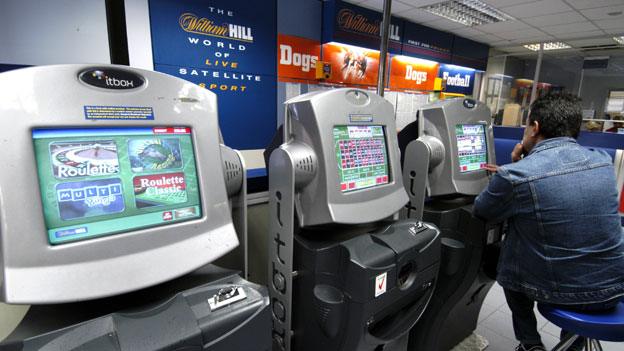'I lost £400k using High Street betting machines'
- Published
Nick Eardley explains how FOBT machines work
A plea to radically reduce the maximum bet on fixed-odds betting terminals was recently rejected by the government. For some, the machines have had a devastating impact.
"I've done about £400,000 to £500,000 in the last eight years and now I've only got my pension. And I still do it. I lose all my money and then struggle."
"John", 69, is a gambling addict. He has spent all the money he inherited when his mother died and the proceeds from selling her former home.
He uses fixed-odds betting terminals (FOBTs) almost every day and says he can't stop. After spending his pension payments, he often turns to loans to make ends meet.
"It's making me ill," he says. "I'm seeking help, but that doesn't seem to be doing it."
Fixed-odds betting terminals
£1.6bn
profit made by bookmakers from the machines in a year*
-
£100 maximum stake per bet
-
£2 what campaigners believe the maximum stake should be
-
£500 maximum win per bet
-
34,874 number of FOBTs in betting shops in the UK*
FOBTs, introduced in 1999, are a growing source of income for bookmakers. Between October 2013 and September 2014, they generated more than half - £1.6bn - of the in-store profit made by bookmakers.
Betting shops are allowed up to four FOBTs in each premises and there are now around 35,000 across the UK. They offer simple touch-screen play, with little prior gambling knowledge needed. Users insert notes or coins, pick a game and are ready to go.
The majority of users play a version of roulette, where they can gamble as much as £100 per spin, in theory every 20 seconds. In the long-term, the machines generally pay out around 97.3% of the money spent on roulette - but winnings and losses can vary, sometimes wildly.
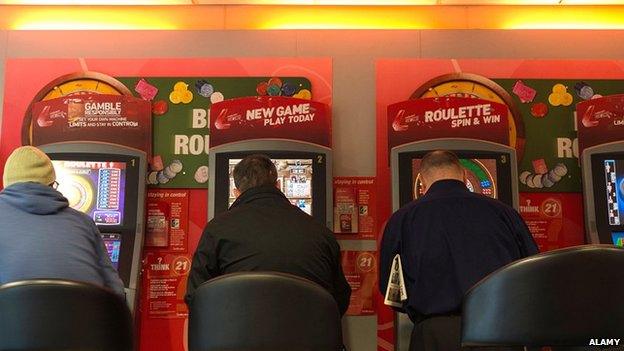
Fixed-odds betting terminals make hundreds of millions of pounds for bookmakers
Last month, the UK government rejected a call from 93 councils in England and Wales for the highest stake to be cut from £100 to £2. It said stronger controls - which give local authorities more power to stop betting shops opening and mean gamblers betting more than £50 per spin have to interact with staff or have an account - were sufficient.
The gambling industry also says there are adequate measures in place to help problem gamblers, while the Gambling Commission says there is little evidence tackling high stakes alone will prevent addiction.

Watch the full film on the Victoria Derbyshire programme website here.
Your stories: BBC News readers describe their experiences with FOBTs

But some people have lost very large sums using FOBTs - and there are claims problem gamblers are more vulnerable to them.
John, whose name we have changed at his request, started using the machines after seeing others win big. At first, he says he could "take them or leave them". Now, he spends whatever he can on the machines.
And if he wins money it is eventually fed back in, simply prolonging the time it takes before he is left with nothing.
"Each time I have a winner, it gives me a boost. I might lose on the next spin and then if I win on the following one, that's a boost again. I keep on thinking I'm going to get my money back, plus a bit."
Does that ever happen? "No".
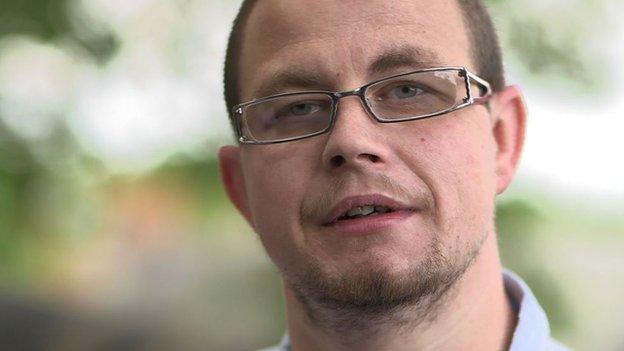
Michael O'Grady says he considered suicide because of his addiction to FOBTs
Michael O'Grady, 31, started using FOBTs a decade ago. He initially gambled what he describes as "fairly non-harmful" amounts, around £20 per session. After a couple of big wins, he got more confident.
"I started having £50 spins and £100 spins, and then that very much led to an absolute obsession with roulette in any form," he says.
Michael, a welding inspector from Middlesbrough, estimates he lost £150,000 on FOBTs, before seeking therapy. He regularly gambled away a full month's wages in one visit to the bookmakers.
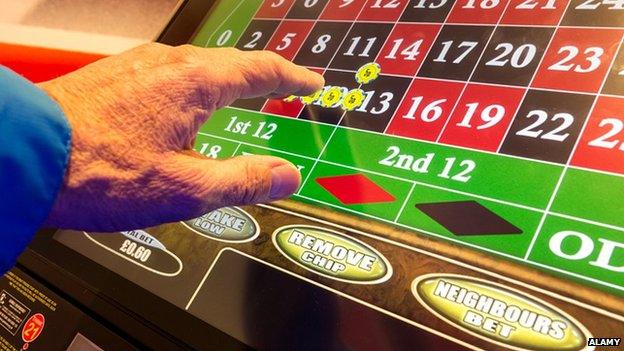
Most of the people we spoke to placed low-stakes sports bets before becoming hooked on the machines
"If you caught me on a bad streak... that could easily add up in half an hour," Michael says.
"It's so fast - there's the opportunity to have another bet every 20 to 30 seconds. There's always another opportunity for another hit or another high," he adds.
"At the point I was at with gambling, you're not playing for the money. You're actually playing for the high."
At the worst stages of his gambling, he considered suicide.
"The money situation and the feeling of hopelessness and that I'm never going to be able to stop... it took me to the point of looking on the internet for the best ways to end your life."
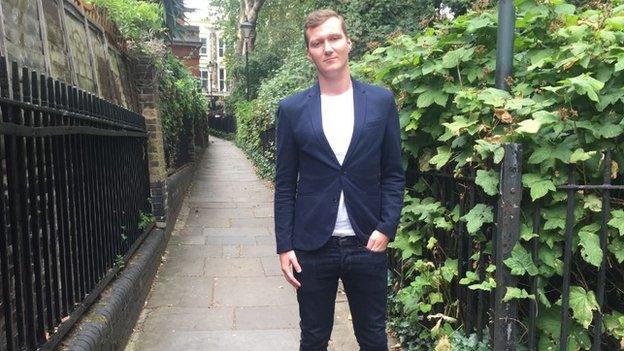
Jamie Davies tried to hide his problem from his family and friends
Most of the men we spoke to (experts say most problem gamblers are male) described participating in low-stakes sports betting before becoming hooked on the machines.
Jamie Davies started using the machines aged 17 after going to the bookies to bet on football. He went on to lose £40,000 over four years, using payday loans to fund his gambling when his wages ran out.
"I found myself trying to make my way out of things, trying to deceive people from where I've been or why I haven't got much money," says Jamie, now 21. "It was a case of not being able to see my friends very often because I didn't have very much money."
Jamie Davies and his mother Jenny Rooney talk about his addiction to FOBTs
He would spend his free time - and later time when he should have been working - on the machines.
And Jamie's gambling had a big impact on his family, with his mother having to borrow money to pay his debts.
'Responsible level'
Academics from the Responsible Gambling Trust say just 3% of bets on the terminals involved the maximum £100 bet between September 2013 and June 2014 in the UK's five biggest bookmakers.
The average loss for FOBT users was £6 in the period covered, they say. But campaigners argue more needs to be done to prevent individuals developing problems.
"FOBTs represent the most addictive form of gambling that's available," says Adrian Parkinson, from the Campaign for Fairer Gambling.
"What you get in the betting shop is completely anonymised, cash-based play. That is what appeals to problem gamblers."
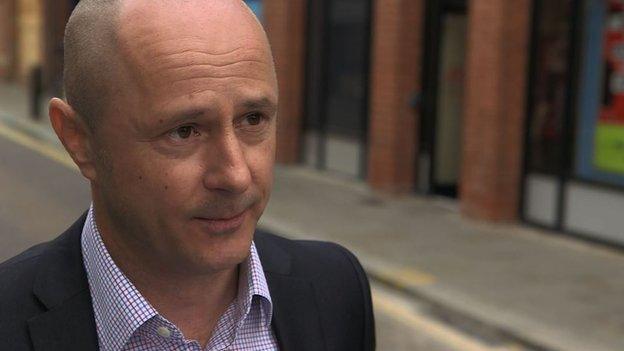
Adrian Parkinson says the maximum bet should be reduced
Mr Parkinson worked for Tote, the bookmaker, when FOBTs were introduced in the UK. He helped develop the machines for almost a decade, but quit after becoming alarmed at the impact they were having.
He says a £2 maximum would bring FOBTs in line with other gambling machines on the High Street.
"The government says in all other easy access gambling venues, the maximum responsible level for gambling on the High Street is up to £2," he says. Should FOBTs be any different?
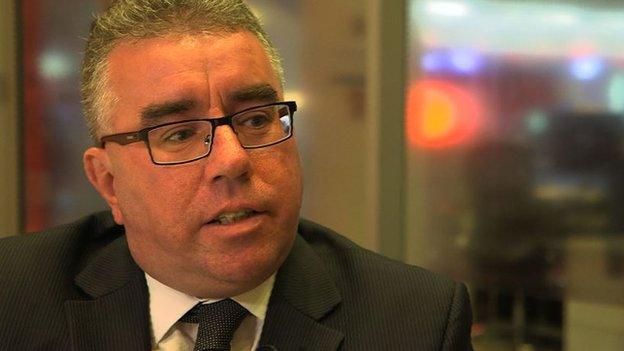
Peter Craske, from the Association of British Bookmakers, said the industry takes steps to prevent problems developing
The Gambling Commission, which regulates gambling in the UK, says it is not clear machines cause people "to develop problems to a greater extent than other forms of gambling."
It says a radical reduction in stake size "would have a significant impact on normal leisure gamblers" but adds "the possible benefits for problem and at-risk gamblers are uncertain".
And the gambling industry believes appropriate controls are already in place. Customers can impose time and cash limits when they play the machines and the Association of British Bookmakers says workers are given extensive training to be able to identify and minimise problem gambling.
"We don't want people getting into difficulty," said the ABB's Peter Craske. "We want people to bet what they can afford and enjoy themselves."
- Published16 July 2015
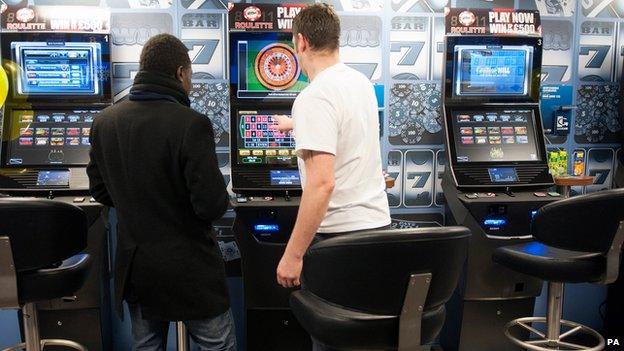
- Published18 June 2013
